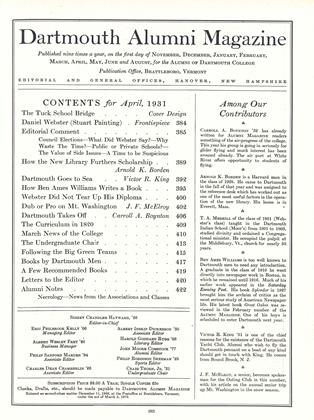By Dr. Charles Allen Dinsmore, '84. pp. 310. Houghton Mifflin Company, 1931.
There are libraries full of books about the Bible, but none quite like this one. Some of these books are concerned with the Higher or Lower Criticism; some portray the religious or ethical development of the children of Israel, as revealed in the Bible; some report on archaeological finds in relation to the Scriptures; and some few attempt to lead their readers into a broader knowledge of the Biblical literature, and a keener appreciation of its beauties and its power over the minds of men. Dr. Dinsmore's volume belongs in the last category, but it is so much superior in quality and in range to most of them that it stands by itself.
The author is preeminently qualified for such a task. Although he does not pretend to be a great Hebrew or Greek scholar discussing the authenticity of this passage or the significance of that manuscript, he uses wisely the findings of three centuries of Biblical study. For five decades he has steeped himself in the King James translation of the Bible, the best ever made in any language, not excluding the original tongues. He has been for years an eminent interpreter of one of the world's greatest works of genius —his books on Dante's Divine Comedy are among the best. A long life spent among the greatest books of the ages, a rare and disciplined literary taste, and a ripe appreciation of the best, illumine every page. And above all else, there is a clarity, elevation and beauty of style which are worthy of his subject, the Bible, which is probably Engand's finest literary masterpiece.
In the first section of the book, Dr. Dinsmore explains why a people so small in number should have exerted such a vast influence. He believes that the peculair genius of that race is due to the fact that the Hebrews were a highly selected and inbred people, severely disciplined by adversity, but blessed with a tradition of spiritual leadership which has never been approached by any other race. The Hebrew mind was intuitive, imaginative, concrete and pictorial; since they were dealing solemnly with the most profound subjects that man can confront, their writings are never light, trivial or undignified. The unique value of the King James version lies in the fact that the religious interest and the literary skill of two great races are combined in this one translation, which is on a higher level than either the English or the Hebrew literature by itself.
In Part 11, the author discusses the books of the Old Testament. The historical books, from Genesis to II Kings, are the earliest history in the world. Before that time there had been chronicles and annals; but it was the nameless authors of the Jahvistic and Elohistic narratives who for the first time wrote a true outline of history, in that they were guided by a principle of unity, namely that "all of man's life on the planet is controlled by the Divine purpose." Dr. Dinsmore's brief analyses and interpretations of one book after another are as lucid as they are profound and inspiring. Possibly the finest chapters in the book are those on Biblical poetry; in Job and in the second Isaiah the author finds the most perfect flower of the Hebrew genius.
The third section, much smaller than either of the other two, deals with the literary values of the New Testament, which is the last fruit of the Hebrew mind. Jesus is not only Israel's greatest religious seer, but one of the world's literary masters, because his words are on a level with his lofty claims. Other chapters consider the work of Paul of Tarsus, the apocalyptical writings, and the other New Testament books.
Dr. Dinsmore's work is no substitute for reading the Bible itself; but it is an indispensable aid to one who is eager to discover and appropraite for himself the priceless treasures of the "greatest book in the world." Drawing upon his vast acquaintance with the world's best in literature, with skilful comparisons and apt illustrations he throws the spot light upon the choicest passages in the Bible. To read the book is to journey over the loftiest summits that the human spirit has ever reached, and with an experienced guide and charming companion. Especially those who are conscious of the gaps in their Biblical knowledge will find both joy and profit in this volume, for one reading will lead them inevitably (as the author undoubtedly hopes) into a renewed love of the Book itself.
 View Full Issue
View Full Issue
More From This Issue
-
 Class Notes
Class NotesCLASS OF 1930
April 1931 By Albert I. Dickerson -
 Lettter from the Editor
Lettter from the EditorEditorial Comment
April 1931 -
 Article
ArticleHow Ben Ames Williams Writes a Book
April 1931 -
 Class Notes
Class NotesCLASS OF 1923
April 1931 -
 Class Notes
Class NotesCLASS OF 1910
April 1931 -
 Article
ArticleHow The New Library Furthers Scholarship
April 1931 By Arnold K. Borden
Roy Bullard Chamberlin
Books
-
 Books
BooksThe April issue of the Current History
June 1931 -
 Books
BooksLEGAL PSYCHOLOGY
FEBRUARY 1932 -
 Books
BooksFACULTY PUBLICATIONS
February 1942 -
 Books
BooksAlumni Notes
March 1947 -
 Books
BooksWHEN YOU BUILD YOUR CHURCH.
May 1955 By EDGAR H. HUNTER JR. '38 -
 Books
BooksTHE TRANSPORTATION ACT OF 1958.
APRIL 1970 By MARTIN L. LINDAHL A.M. '40



